| Listing 1 - 10 of 37 | << page >> |
Sort by
|
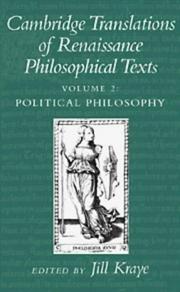
ISBN: 0521597722 0521592089 Year: 1997 Publisher: Cambridge Cambridge University press
Abstract | Keywords | Export | Availability | Bookmark
 Loading...
Loading...Choose an application
- Reference Manager
- EndNote
- RefWorks (Direct export to RefWorks)
Ancient ethics --- Antieke ethiek --- Ethics [Ancient ] --- Ethiek [Antieke ] --- Ethiek van de Oudheid --- Ethique de l'Antiquité --- Etres humains --- Homme (Humanité) --- Hommes (Humanité) --- Human beings --- Humanité (Ensemble des êtres humains) --- Humans --- Mankind --- Mens --- Mensdom --- Mensen --- Mensheid (Geheel der mensen) --- Ethics --- Political science --- Philosophy --- Filosofie ; vertalen ; renaissance --- Filosofische teksten ; vertalen ; renaissance --- Filosofie ; vertalen ; renaissance. --- Filosofische teksten ; vertalen ; renaissance. --- Administration --- Civil government --- Commonwealth, The --- Government --- Political theory --- Political thought --- Politics --- Science, Political --- Social sciences --- State, The --- Homo sapiens --- Human race --- Humanity (Human beings) --- Humankind --- Man --- People --- Hominids --- Persons
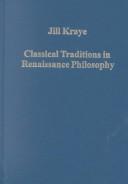
ISBN: 0860788806 Year: 2002 Volume: 743 Publisher: Aldershot Ashgate
Abstract | Keywords | Export | Availability | Bookmark
 Loading...
Loading...Choose an application
- Reference Manager
- EndNote
- RefWorks (Direct export to RefWorks)
Philosophy, Renaissance --- Philosophy, Modern --- Renaissance philosophy
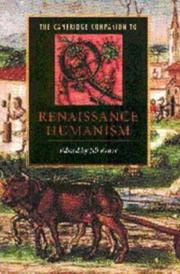
ISBN: 0521436249 0521430380 0511999267 9780521430388 9780511999260 9780521436243 Year: 1996 Publisher: Cambridge Cambridge University Press
Abstract | Keywords | Export | Availability | Bookmark
 Loading...
Loading...Choose an application
- Reference Manager
- EndNote
- RefWorks (Direct export to RefWorks)
From the fourteenth to the seventeenth century, humanism played a key role in European culture. Beginning as a movement based on the recovery, interpretation and imitation of ancient Greek and Roman texts and the archaeological study of the physical remains of antiquity, humanism turned into a dynamic cultural programme, influencing almost every facet of Renaissance intellectual life. The fourteen essays in this 1996 volume deal with all aspects of the movement, from language learning to the development of science, from the effect of humanism on biblical study to its influence on art, from its Italian origins to its manifestations in the literature of More, Sidney and Shakespeare. A detailed biographical index, and a guide to further reading, are provided. Overall, The Cambridge Companion to Renaissance Humanism provides a comprehensive introduction to a major movement in the culture of early modern Europe.
Humanism. --- Renaissance. --- Neo-Latin literature --- anno 1400-1499 --- anno 1500-1599 --- Humanism --- Humanisme --- Renaissance --- European literature --- Civilization, Modern --- Littérature européenne --- Civilisation moderne et contemporaine --- humanism --- Littérature européenne --- neo-Latin [language] --- History of civilization --- anno 1600-1699 --- Revival of letters --- Civilization --- History, Modern --- Civilization, Medieval --- Middle Ages --- Philosophy --- Classical education --- Classical philology --- Philosophical anthropology --- History --- Europe --- Intellectual life --- Vie intellectuelle --- Revival --- History & Archaeology --- History - General
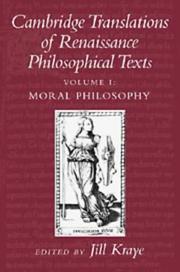
ISBN: 0521426049 0521415802 0511803044 Year: 1997 Publisher: Cambridge : Cambridge University Press,
Abstract | Keywords | Export | Availability | Bookmark
 Loading...
Loading...Choose an application
- Reference Manager
- EndNote
- RefWorks (Direct export to RefWorks)
The Renaissance, known primarily for the art and literature that it produced, was also a period in which philosophical thought flourished. This two-volume anthology contains 40 new translations of important works on moral and political philosophy written during the Renaissance and hitherto unavailable in English. The anthology is designed to be used in conjunction with The Cambridge History of Renaissance Philosophy, in which all of these texts are discussed. The works, originally written in Latin, Italian, French, Spanish, and Greek, cover such topics as: concepts of man, Aristotelian, Platonic, Stoic, and Epicurean ethics, scholastic political philosophy, theories of princely and republican government in Italy and northern European political thought. Each text is supplied with an introduction and a guide to further reading.
Arts and Humanities --- Philosophy --- Ethics --- Political science --- Human beings --- Homo sapiens --- Human race --- Humanity (Human beings) --- Humankind --- Humans --- Man --- Mankind --- People --- Hominids --- Persons --- Administration --- Civil government --- Commonwealth, The --- Government --- Political theory --- Political thought --- Politics --- Science, Political --- Social sciences --- State, The
Book
Year: 2011 Publisher: Genève Droz
Abstract | Keywords | Export | Availability | Bookmark
 Loading...
Loading...Choose an application
- Reference Manager
- EndNote
- RefWorks (Direct export to RefWorks)
Philosophy --- anno 1600-1699 --- Europe

ISBN: 0521597722 Year: 1997 Publisher: Cambridge Cambridge University Press
Abstract | Keywords | Export | Availability | Bookmark
 Loading...
Loading...Choose an application
- Reference Manager
- EndNote
- RefWorks (Direct export to RefWorks)
Ethics [Ancient ] --- Human beings --- Political science --- Philosophy --- History

ISBN: 0521587573 Year: 1997 Publisher: Cambridge Cambridge University Press
Abstract | Keywords | Export | Availability | Bookmark
 Loading...
Loading...Choose an application
- Reference Manager
- EndNote
- RefWorks (Direct export to RefWorks)
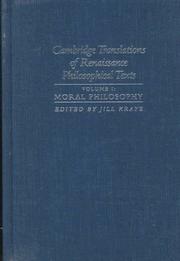
ISBN: 9780511803048 9780521415804 9780521426046 Year: 1997 Publisher: Cambridge Cambridge University Press
Abstract | Keywords | Export | Availability | Bookmark
 Loading...
Loading...Choose an application
- Reference Manager
- EndNote
- RefWorks (Direct export to RefWorks)
Article
Abstract | Keywords | Export | Availability | Bookmark
 Loading...
Loading...Choose an application
- Reference Manager
- EndNote
- RefWorks (Direct export to RefWorks)
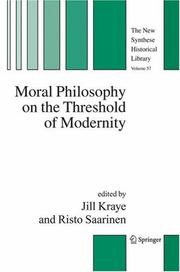
ISBN: 1402030002 9048167655 9786610263677 1280263679 1402030010 Year: 2005 Publisher: Berlin Springer
Abstract | Keywords | Export | Availability | Bookmark
 Loading...
Loading...Choose an application
- Reference Manager
- EndNote
- RefWorks (Direct export to RefWorks)
This volume investigates the paradigm changes which occurred in ethics during the early modern era (1350-1600). While many general claims have been made regarding the nature of moral philosophy in the period of transition from medieval to modern thought, the rich variety of extant texts has seldom been studied and discussed in detail. The present collection attempts to do this. It provides new research on ethics in the context of Late Scholasticism, Neo-Scholasticism, Renaissance Humanism and the Reformation. It traces the fate of Aristotelianism and of Stoicism, explores specific topics such as probabilism and casuistry, and highlights the connections between Protestant theology and early modern ethics. The book also examines how the origins of human rights, as well as different views of moral agency, the will and the emotions, came into focus on the eve of modernity. Target audience: students of medieval, Renaissance and Reformation history; students of the history of philosophy, ethics and theology; those interested in humanism, human rights and the history of law.
Moral philosophy. --- Ethics --- Ethics, Medieval. --- Political ethics --- Ethics, Medieval --- Medieval ethics
| Listing 1 - 10 of 37 | << page >> |
Sort by
|

 Search
Search Feedback
Feedback About UniCat
About UniCat  Help
Help News
News